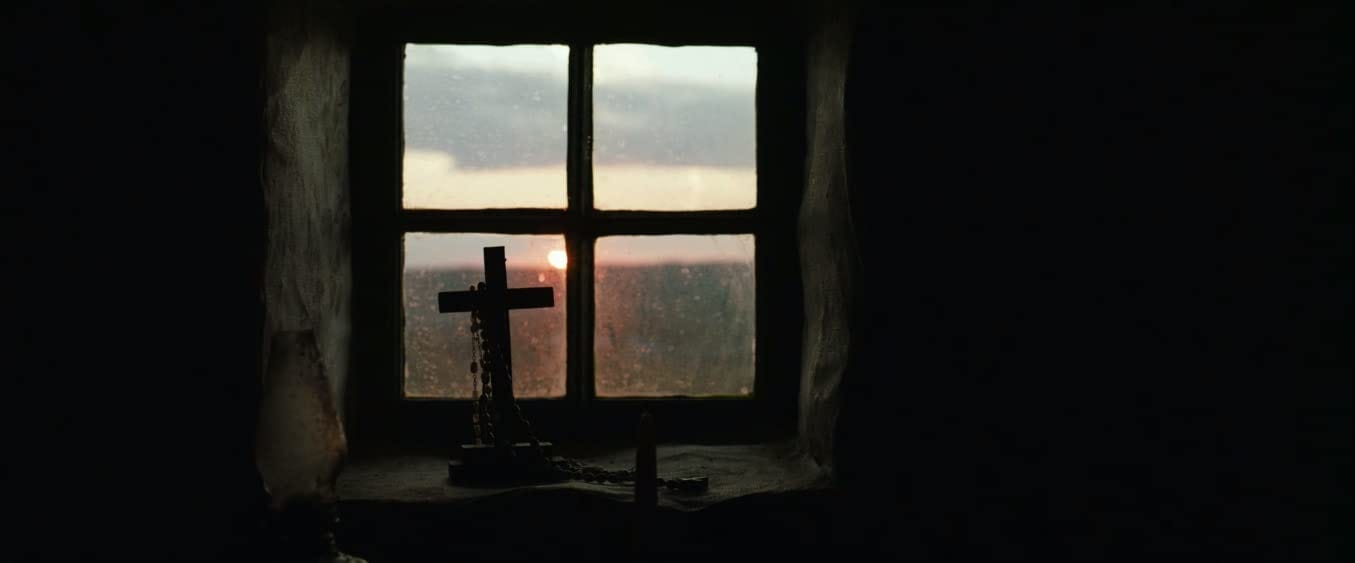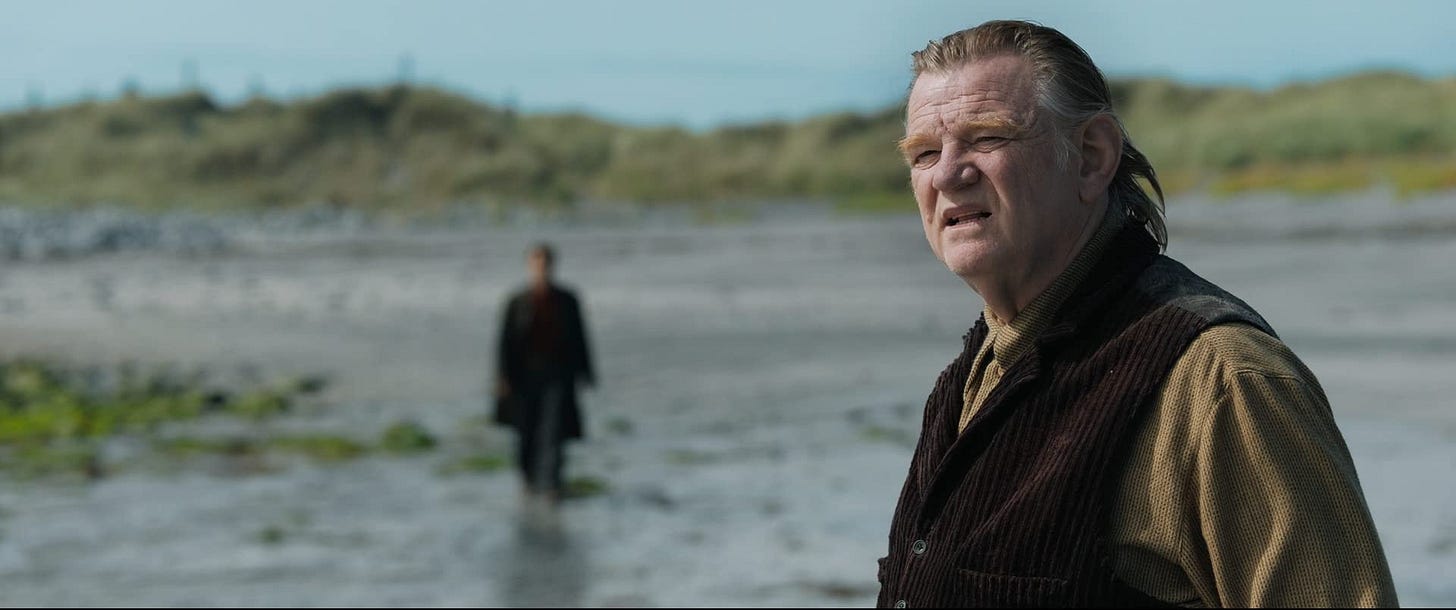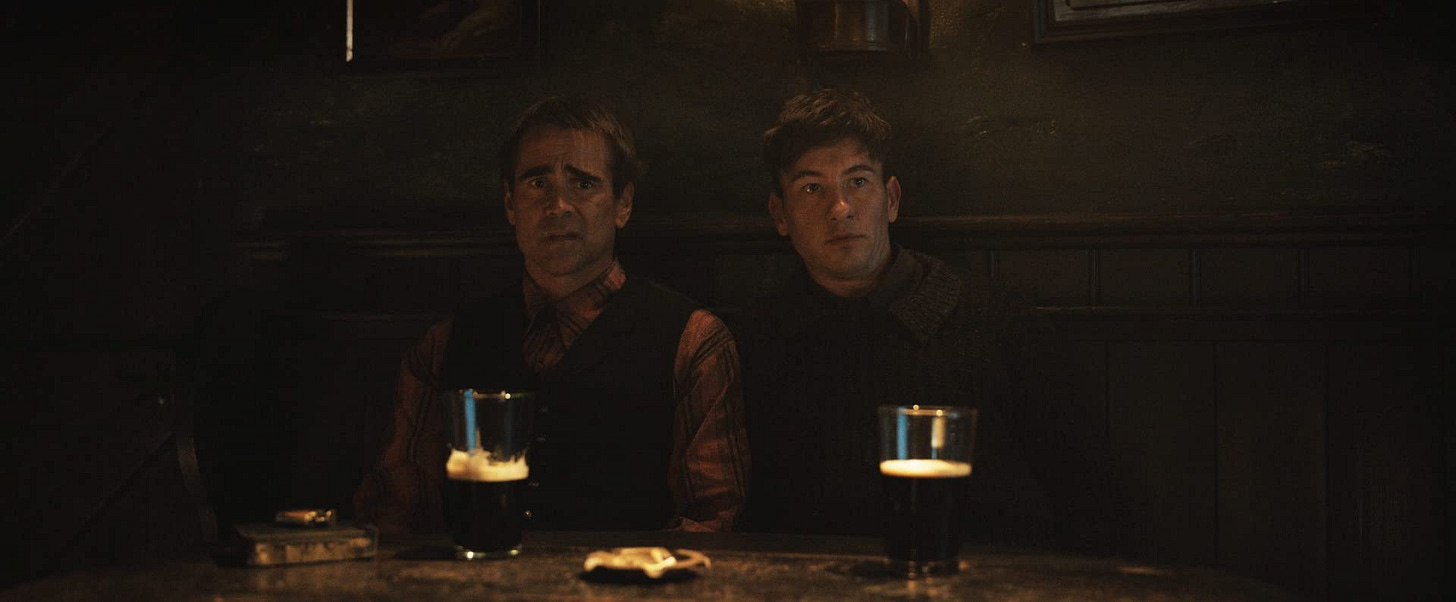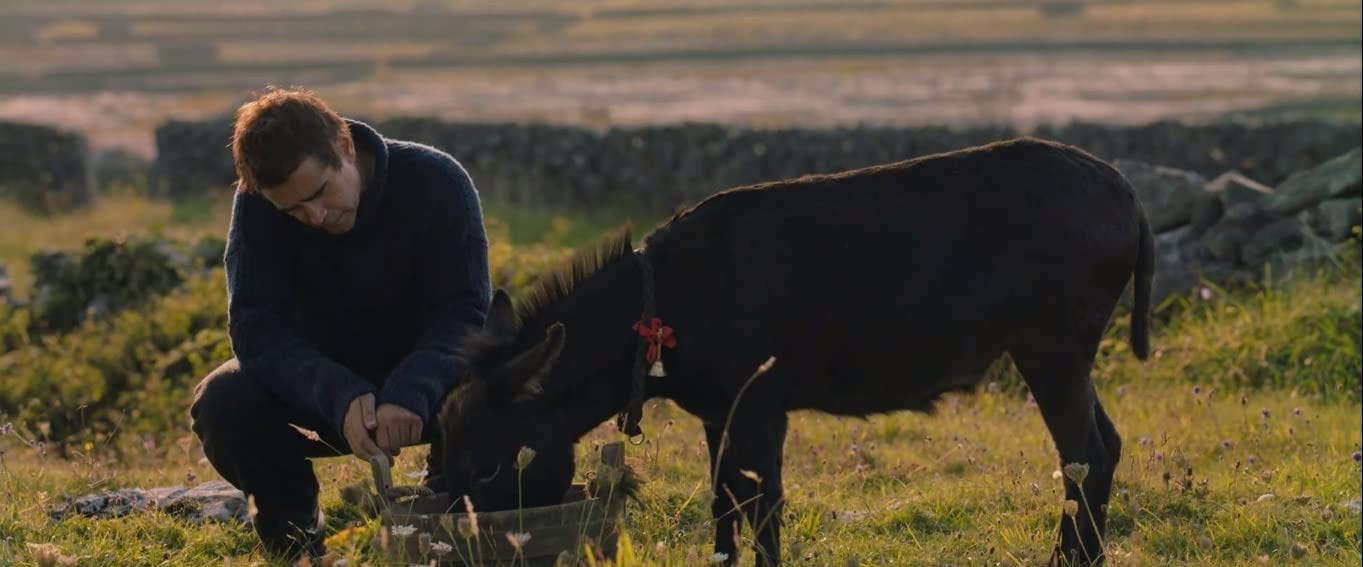The Banshees of Inisherin: the meaning of the film (will be useful to everyone)
What is this story about?
The infantile ego is not only a source of wealth (as we learned in this material about the basics of egonomics), it is also the cause of various troubles and tragedies. For some prime examples of how infantile ego or, in other words, pride, manifests itself in life, be sure to watch The Banshees of Inisherin.
What is the message of The Banshees of Inisherin?
“Receive without pride, let go without attachment.” — Marcus Aurelius
Immediately after watching, I was rather depressed and confused, and did not catch the meaning of this story 😄 However, the very next day, some interesting thoughts came to me and my friend, and we felt that this film is a real masterpiece.
After that, I tried to find good explanations of The Banshees of Inisherin, but all the descriptions that I read were not entirely convincing. So, that's why I decided to offer this interpretation. There are spoilers, of course.

From our point of view, one of the most important themes of The Banshees of Inisherin is the sin of pride. It seems to us that if you watch the film through the prism of pride and ego, you can better understand the plot and dialogues. With this key, the story no longer looks weird and chaotic.
A clue to understanding the film is the literal reference to “pride”, which occurs twice in the screenplay. Both times this word is spoken by Colm Doherty when he confesses his sins to the priest.
First time:
COLM: Ah, just the usual, I suppose, Father. The drinking and the impure thoughts. And a bit of pride, I suppose. Although I never really saw that as a sin, but sure I’m here now.
PRIEST: And how’s the despair?
And the second time:
COLM: Well... all the ones from the last time you didn’t fogive me for... multiplied be two, of course. (pause) Definitely pride, this time. (pause) I killed a miniature donkey. It was be accident, but I do feel bad about it.
PRIEST: Do you think God gives a damn about miniature donkeys, Colm?
COLM: I fear he doesn’t. And I fear that’s where it’s all gone wrong.
Interestingly, both times the priest does not react in any way to Colm's confession of the sin of pride. Obviously, he does not consider this a big problem. Well, pride often seems “minor” to people, it is one of the most difficult sins to understand. Meanwhile, the idea that pride is the root of all other sins is quite well known.
Like the infantile ego, pride is a mindset to prove one’s worth, a mindset to compare and compete. What do others think of me? Where do I stand compared to others? Am I smarter, more talented, better than others in something?
If mental well-being depends on the answers to these questions, then we are dealing with a time bomb that can lead to the most deplorable consequences. The Banshees of Inisherin illustrates exactly how this happens.
In fact, both main characters, Padraic Suilleabhain and Colm Doherty, suffer from pride. The difference between them is only in what external way they try to prove their value and superiority.
Padraic's ego is philistine, “simple”, and Colm is a dour dreamer. Padraic stands up for his “niceness” here and now in the eyes of people living today, and Colm would like to write his name in history. This conflict is clearly expressed in one of the scenes in the pub:
PADRAIC: You used to be nice! And now, do you know what you are? Not nice.
COLM: Ah, well, I suppose niceness doesn’t last then, does it, Padraic? But will I tell ya something that does last? Music lasts. And paintings last. And poetry lasts. (...) Do you know who we remember for how nice they was in the 17th century?
PADRAIC: Who?
COLM: Absolutely no one. Yet we all remember the music of the time. Everyone, to a man, knows Mozart’s name. (...)
PADRAIC: Well, I don’t, so there goes that theory. And anyway, we’re talkin’ about niceness. Not whatsisname. My mammy, she was nice. I remember her. And my daddy, he was nice. I remember him. And my sister, she’s nice. I’ll remember her. Forever I’ll remember her.
COLM: And who else will?
PADRAIC: “Who else will” what?
COLM: Remember Siobhan and your niceness? No one will.
Ultimately, both are mistaken as long as they try to find the source of their satisfaction in assessments from outside.
“You might just be a bit depressed, Colm”
Give yourself a gift: the present moment. People out for posthumous fame forget that the Generations To Come will be the same annoying people they know now. And just as mortal. What does it matter to you if they say x about you, or think y? — Marcus Aurelius
Colm rejects Padraic's friendship amid a deep inner crisis, which he hopes to overcome through music. However, he is interested not so much in creativity itself, but in the recognition of his personality by other people.
It's not that Colm just wants to make music in complete seclusion. In fact, he is guided by the idea of “to seem, rather than to be.” Otherwise, he would not deprive himself of the fingers that are essential to create.
No, he does not need the creative process itself. He needs the thought of a potential greatness that could elevate him above other people, prove that he is truly “special” and similar to such famous people as Mozart. However, as he reflects on his supposed legacy, Colm loses the joy of living, even loses the ability to create this legacy.
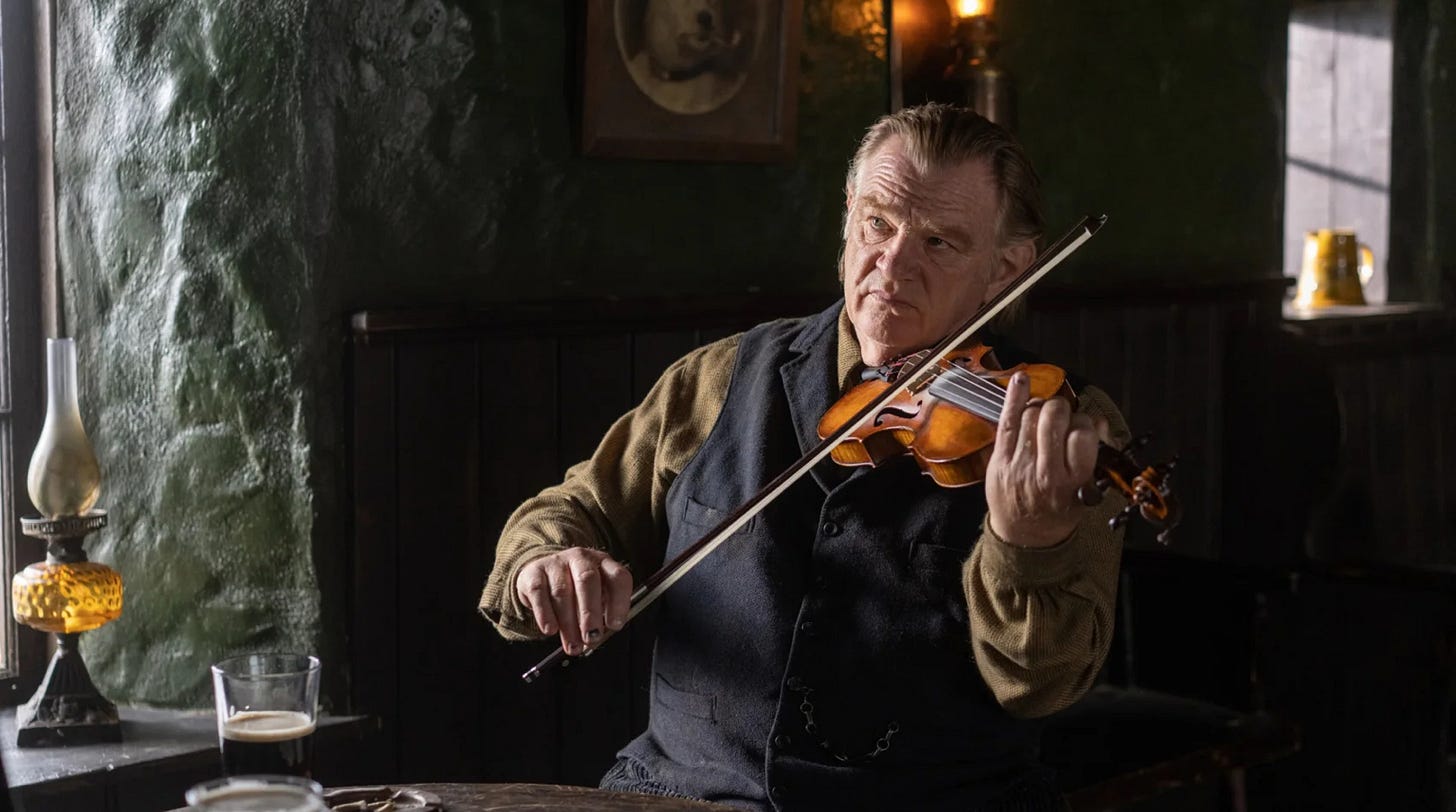
The pressure from the seeming need to leave the legacy that Colm creates in his own head, he projects onto Padraic. Colm seems to be saying that it is Padraic who is preventing him from achieving greatness. It’s also quite a classic story for a creative person who, suffering from internal ego problems, tends to shift them onto other people; if something doesn't work out, it's others who “get in the way”.
At the same time, Colm is a very interesting person. He is able to scorn physical pain and perform noble deeds (just remember how he helped the beaten Padraic, and then stood up for him in the pub). He is considered a thinker on the island, and this is true; it is enough that Colm is able to recognize his pride.
It seems that he is close to understanding, which could make him wise. Perhaps that is why his mistakes are more expensive. It is Colm who starts the tragic chain of events.
But it is funny that even though Colm has given up on chasing the “nice guy” title here and now, he still often fits this role when you look at the actual actions. The opposite case is Padraic.
“I’m Padraic Suilleabhain and I’m nice!”
“If you do not worry about what others think, say or do, but only about whether your actions are just and godly, you will gain time and tranquillity.” — Marcus Aurelius
It's so easy to be fooled by Colin Farrell's cute eyebrows... The audience is deliberately made to feel sympathy for Padraic. At first, he seems like a very familiar classic character, someone like Forrest Gump: naive and a little goofy, but still a good, sincere guy. However, as the story progresses, we can see more and more controversial details.
In fact, Colm's decision to end friendship is the trigger that hurt Padraic's pride, made his ego bleed. Apparently, his sense of self-worth was tied to Colm's approval. Almost all of Padraic's speeches are permeated with the desire to restore the “status”, to “take revenge”, to prove that he is nice.
Do others consider him a stupid simpleton who can only talk about donkey poop? Isn't he a good guy? Could it be that everything he does and says is not worthy of respect?
PADRAIC: Do you think I’m dull?
SIOBHAN: No. ‘Cause you’re not dull, you’re nice.
PADRAIC: That’s what I thought. I mean, I’m a happy lad. Or I was. Till me best friend started acting the gilly-gooly.

Padraic is obsessed with the opinions of others, constantly comparing himself with others, not avoiding dirty methods. For example, he shamelessly insults his only remaining “friend”, Dominic (although Padraic himself is not pleased if someone talks behind his back).
PADRAIC: And... people don’t be laughing at me behind me back, do they?
SIOBHAN: No. Why would they be?
PADRAIC: I don’t know. Because of me miniature animals?
SIOBHAN: No. They think it’s nice. I think it’s nice. Just outside.
PADRAIC: And they don’t think I’m dim, or anything?
SIOBHAN: Dim? No.
PADRAIC: You don’t seem very sure about it!
SIOBHAN: Of course I’m sure about it.
PADRAIC: Dominic’s the dim one on the island, isn’t he?
SIOBHAN: He is, aye. By miles.
PADRAIC: Hang on. By miles, and then who’s the next dimmest?
SIOBHAN: Well I don’t like to judge people in those terms now, do I?!
PADRAIC: In what terms?
SIOBHAN: In the order of their dimness.
PADRAIC: I know you don’t, and neither do I, do I? But try, like.
SIOBHAN: No! I won’t try. There’s enough judgey people on this fecking island. So, no, you’re not dim. You’re a nice man, alright? So move on!
Padraic again and again seeks confirmation of his status. “To seem, rather than to be…” As always with the infantile ego, external status, some imaginary idea of oneself means much more to a person than reality.
GERRY: Just because he thinks you’re dull? Sure, that’s going overboard.
PADRAIC: Who told you about the dull? (...) Do you think I’m dull, Gerry?
GERRY: No. That said... I did think the two of ye always made a funny pairing, like.
PADRAIC: No, we didn’t.
JONJO: Yeah, ye did... (...) Colm was always more of a thinker.
PADRAIC: Huh?! Why’s every...? I think!
JONJO: Ah, you don’t, Padraic. Your sister does. (...) You’re more of life’s good guys.
PADRAIC: I used to think that’d be a nice thing to be, one of life’s good guys. And now, it sounds like the worst thing I ever heard.
JONJO & GERRY: Ah, don’t take it like that, Padraic. We’re on your side.
Notice how Padraic's ego comes into play when he talks to Mrs. O'Riordan and Policeman Peadar. He felt that he must somehow take revenge on unpleasant interlocutors, and find nothing better than to expose his “friend” Dominic to the risk of another attack from his father.
MRS O’RIORDAN: This man has no news. Don’t you not, No-Newsy!
PEADAR: Stukes never have news.
MRS O’RIORDAN: Stukes! Funny.
PADRAIC: There was a bit of news I remembered, Mrs O’Riordan. Dominic Kearney’s father beat Dominic senseless with a kettle Saturday, and it’s staying with me and me sister Dominic is, so’s, at least his father’ll take a bit of a break from his beating of him, and him a policeman. Isn’t that news?
MRS O’RIORDAN: Ar, that Dominic’s an awful little bollocks. That’s no news.
PADRAIC: Still... he was in a bad way when I came upon him...
MRS O’RIORDAN: I’d beat him with a kettle meself if I wasn’t old.
PADRAIC: It’s news is all, I’m saying.
MRS O’RIORDAN: That’s no news. That’s shite news.
The only thing that interests Padraic is himself. He is deaf to his sister's requests not to bring animals into the house, deaf to Dominic's real problems in conversations with him, and also completely ignores Colm's wishes and threats.
When Colm begins to deprive himself of fingers, Padraic doesn't show an iota of empathy, continuing to pester him, trying to retain his approval and attention. He is absolutely indifferent to how much injury Colm inflicts on himself. In fact, the very word “friendship” in this case is just a fiction.
Literally in every scene, in every dialogue, you can see manifestations of his selfishness. For example, here is Padraic's reaction after he learns of Siobhan's departure:
PADRAIC: And who’s going to do the cooking?!
SIOBHAN: Oh, that’s your first question, is it? “Who’s going to do the cooking?”
PADRAIC: Well it wasn’t me first question, was it? “But what about me?” was me first question.
Finally, Padraic's “niceness” reaches its peak. First, he got rid of the musician by cruel deceit, and after a while he tried to burn Colm alive.
If Padraic had once thought about whether his actions were really good, not other people's thoughts about him, then the result could be completely different. Instead, we have a sad end with tragedies, some of which have gone almost unnoticed...
What happened to Dominic?
“Very little is needed to make a happy life; it is all within yourself in your way of thinking.” — Marcus Aurelius
The tragic fate of Dominic, one of the film's most important storylines, seems to be hidden from view. Meanwhile, it was Padraic who delivered one of the final, decisive blows to Dominic.
PADRAIC: There’s this musician fella Colm was getting along great with, and what did I do? I went and sent him packing from the island!
DOMINIC: Did ya? How?
PADRAIC: I told him a bread van crashed into his Daddy, and he’d have to be rushing home to him, lest he die.
DOMINIC: Oh… That sounds like the meanest thing I ever heard.
PADRAIC: Huh? Well, aye, it was a bit mean, but he’ll be fine once he gets home and he finds his daddy hasn’t been hit be a bread van. And how can that be the meanest thing you ever heard?! Your Daddy killed a little Japanese man!
DOMINIC: I used to think you were the nicest of them. Turns out you’re just the same as them.
PADRAIC: I am the nicest of them.
DOMINIC: I thought you were a happy lad.
PADRAIC: I am a happy lad... Ar, Dominic, now! Well, maybe I’m not a happy lad, so! Maybe being a happy lad just doesn’t cut the custard anymore!
DOMINIC: Mustard.
PADRAIC: Maybe this is the new me! Aye. Maybe this is the new me.
Inisherin is a metaphorical “middle of nowhere”. Here on the island, there are few opportunities to build the happiness on external aspects. It is not surprising that Padraic finally goes crazy at the very moment when two more supports (besides Colm) disappear from his small spectrum of ego-hopes: the donkey dies, and the sister leaves for the mainland.
However, unlike Padraic, who still hope to “win” satisfaction outside, Dominic no longer sees such an opportunity. His father we’ll leave without comments. His prospects for achieving something significant in life seem to be almost none. Padraic's sister Siobhan rejects him. In addition, the only “nice” guy turned out to be exactly the same as everyone else Dominic had ever met.
Not seeing a single opportunity to find the inner strength on a godforsaken island, Dominic is suddenly left alone with pitch, impenetrable darkness. There is nothing else outside to give him hope. As a result, he commits suicide.

This doesn't seem to bother anyone very much. The film and its main characters do not seem to notice Dominic's suicide. Padraic, blind and deaf to everything but his pain, immersed in personal drama, writes in a letter to his sister that Dominic probably just “slipped and fell in”.
In this case, neither severed fingers nor death were able to awaken people who are focused on gratifying their ego. In the end, friendship, love, and dignity on Inisherin are but shadows, only words. Nothing more than ghosts…
If the characters in The Banshees of Inisherin seem crazy, then they are. A person with a wounded ego has no other way but to become, in a sense, insane. Soon, we will continue to delve deeper into the nature of the infantile ego and detail some interesting themes:
— ego-dependence on the “smart/stupid” parameter (and how to monetize it)
— infantile ego as the cause of despondency, procrastination, etc.
And, of course, we will continue to analyze the secrets of wealth and popularity. Subscribe to never miss new letters.
Read next → Path of the Serpent: 6 Main Sources of Money




